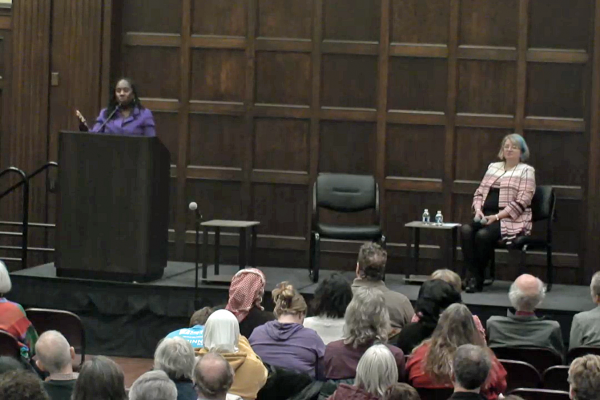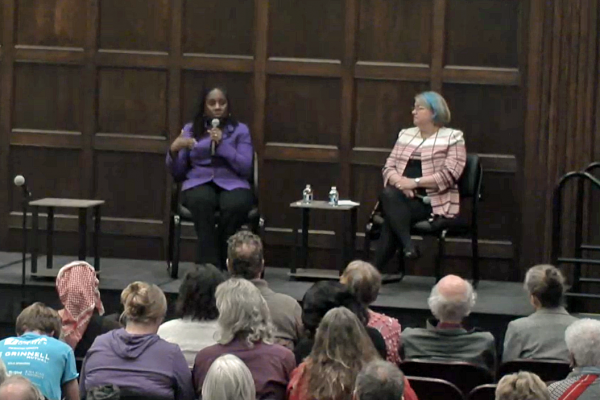Civil rights lawyer and scholar Sherrilyn Ifill discussed why she feels the country is facing a “glorious opportunity” to “get really serious about the project of America” during a conversation moderated by Catt Center director Karen M. Kedrowski for the 2024 Martin Luther King Jr. Commemorative Lecture. The event was held on Jan. 25 in the Great Hall of the Memorial Union at Iowa State University.
“I think at this moment, it is an opportunity for us to imagine what we can be, to take seriously that project with all of its challenges and difficulties, and to commit ourselves to recognizing that what we are trying to do when we bring together [all Americans]…is that we are committing ourselves to the project created by the framers,” Ifill said. “And by the framers, I’m referring to the framers of the amendments following the Civil War who had the courage to do what the original framers did not, and set us on a path towards being a multiracial democracy.”

Kedrowski’s first question for Ifill was about the history, achievements, and mission of the NAACP Legal Defense Fund and her role there. Ifill explained that the LDF was founded in 1940 by Thurgood Marshall as the legal arm of the NAACP, becoming a separate organization in 1957. The LDF represented many of the key figures of the Civil Rights Movement, including Dr. King, and continue their work in civil rights litigation today.
Ifill litigated voting rights cases for LDF for five years early in her career and later served as LDF president and director-counsel from 2013-2022, and said that she has long considered it her professional home. One of changes that she made when she became the leader of that organization was bringing the discussion of the issues out of the courtroom, positioning the LDF as a reliable source of information about the issues.
“I felt that our responsibility was not only to litigate cases, not only to influence legislation, but also to play a role in engaging in the narrative that’s happening in the public space,” she said.
The conversation then turned to the significance of the passage of the Voting Rights Act of 1965 and the landscape of voting rights today. Ifill praised the innovative and bipartisan nature of the Voting Rights Act, and expressed disappointment in how the 2013 Shelby v. Holder decision by the U.S. Supreme Court removed an important tool in addressing ongoing and new voting discriminatory practices. She said the good news, however, is “how resilient people are in desiring to vote,” citing as one example the mask-wearing voters waiting in long lines in Milwaukee to vote in the 2020 general election.
She also addressed the question of large-scale voter fraud and how, even though it has been debunked, it has been used to support increasingly restrictive voting measures. “The line has moved, and voting rights has now been cast and framed as a partisan issue. But that doesn’t make it a partisan issue because people are saying it is. It never was. And in a democracy, voting is a critical right to access.”
The conversation was then opened up to questions from the audience. When asked about the 14th Amendment cases against former Pres. Trump being on the presidential ballot, Ifill took several minutes to talk about the 13th, 14th, and 15th Amendments to the Constitution and how transformative they were for American democracy. She said that while Section 3 of the 14th Amendment is clear that officeholders who participate in insurrection or rebellion cannot serve in state or federal government, it’s not clear how the current Supreme Court will respond.

Another audience member asked about the place of youth in activism and what today’s youth can draw on from previous movements. Ifill was quick to encourage the students in the audience to be engaged, reminding the audience that the Civil Rights Movement was populated with college students and other young adults, and that there is a role for everyone.
“And this is the value of young people, which is, you don’t get everything right, you know, but you are impatient. And that is critical in times of transformation,” she said. Giving several examples of the importance of young activists to the Civil Rights Movement, Ifill said, “I think it’s important for young people to feel like they can speak, to put their voice out there and to know that they play a vital role in transformation.”
The final question of the evening came from a student who expressed concern over the possibility of another civil war, resistance to federal authority by leaders of several states, and the power that one man and his followers currently hold.
Ifill acknowledged her own concern, saying that the supremacy clause is in the Constitution and has been upheld by the Supreme Court, and we should be deeply concerned when political leaders don’t think they need to comply.
“When the hunger for power outweighs your responsibility to the country and your responsibility to the Constitution, then we are deeply in trouble.”
She pointed out that the problems our democracy faces were not created by Donald Trump, calling him an “accelerant,” and said that the past several years have made clear the flaws in our democracy and that we have a short window of time to make changes.
Ifill ended her remarks by saying, “I do think it’s important to ring the alarm and tell people, ‘This is the time to wake up. We don’t have very much time.’ And you have to be able to say what you believe is true and you have to act on what you believe is true. And it has to be now. You have to decide.”
The event was sponsored by the Office of the Vice President for Diversity, Equity and Inclusion; Multicultural Student Affairs; the University Library; the Colleges of Engineering, Design, Veterinary Medicine, and Agriculture and Life Sciences; the Carrie Chapman Catt Center for Women and Politics; the Political Science Department; and the Committee on Lectures (funded by Student Government).
A recording of the event is available on the Lectures Program website.